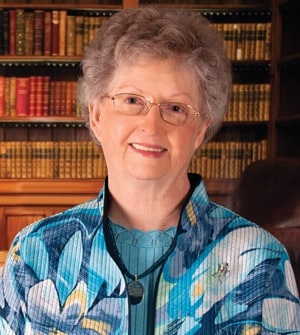Support from UAMS Helps Ann Elmore Live with Lymphedema
| After undergoing surgery for breast cancer in 1997, Ann Elmore knew something wasn’t quite right with her left arm. “My arm would swell, and I would get it treated, time after time,” she said.

Retired teacher and librarian Ann Elmore has learned to manage her lymphedema symptoms with the help of UAMS.
In 2002, after numerous appointments with her doctors, she was referred to Dr. Reed Thompson at UAMS.
Dr. Thompson diagnosed Ann, a retired teacher and librarian from Lonoke, with lymphedema, which is the swelling of the limbs caused by fluid buildup in soft tissue. The most common cause of lymphedema is the removal of the lymph nodes at the time of surgery, usually for cancer. Other causes include: infections, injury and radiation therapy. There also are rare cases of people being born with the condition.
“For over six years, I had gone from doctor to doctor, and none of them ever mentioned lymphedema,” Ann said. “Coming to Dr. Thompson was the best thing for me because I was able to finally understand what was happening to my arm.”
Dr. Thompson sees patients in the Lymphedema Clinic and Palliative Care Clinic at the UAMS Winthrop P. Rockefeller Cancer Institute.
Ann now takes the information she learns about managing lymphedema and shares it with members of the Lymphedema Support Group at UAMS. The support group meets from 11 a.m.-12:30 p.m. on the third Tuesday of each month January through November at the UAMS Family Home. “It feels great to be able to lean on a network of people who know exactly what you are going through,” Ann said.
A member of the Lymphedema Support Group for almost 10 years, Ann has learned the best techniques for keeping her condition under control. She makes sure to avoid lifting, reduces sun exposure to the affected area, massages the area frequently to reduce any swelling and wears a compression garment.
According to licensed clinical social worker Debby Dean, education is very important for those living with lymphedema. “Lymphedema is a life-altering condition. Our goal is to make sure our patients are equipped with the knowledge and skills to live whole and fulfilling lives, while keeping their lymphedema symptoms under control,” Dean said.
In addition to the open discussion sessions, the group also invites guest speakers to share information on cutting-edge treatments and how to live a productive life with lymphedema. The speakers include nutrition, exercise and medical experts. “We take great pride in being able to provide speakers who have a thorough understanding of what patients with lymphedema go through on a daily basis,” Debby said.
The information Ann and the other members of the support group have learned has been invaluable to managing their condition. Ann said some of the most important tips include:
• Avoid having blood pressure measured from the affected limb
• Avoid any needle sticks to the affected limb
• Watch for any cuts or abrasions to the affected area
• Sleep with the affected area elevated
• Stay active
In March, Ann was named UAMS’ Lymphedema D-Day honoree in conjunction with National Lymphedema Day, which is celebrated annually March 6. The award is given to lymphedema patients who have contributed to the community or who have shown great courage in their struggle with the disease. “I am so honored by this award,” Ann said. “I really enjoy being a part of a group that works to make the lives of others affected with lymphedema better.
Selected by her fellow support group members, Ann received a lymphedema butterfly pin and certificate from the National Lymphedema Network.
“I think it’s important that we get the word out about lymphedema and the wonderful resources we have here at UAMS. I always see commercials on television about other cancer treatment centers, and I think it’s important that people know they can get superior treatment here at UAMS,” Ann said.
For more information on the Lymphedema Support Group, visit cancer.uams.edu/SupportGroups or call (501) 686-8145.